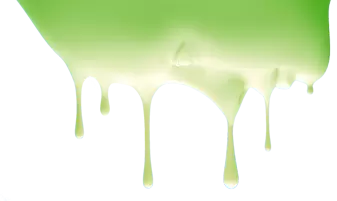Are Ghost Hunting Shows 'Reality' TV?
The rise of the modern day ghost hunter can largely be attributed to interest generated by a slew of paranormal-themed television shows that surfaced in the first decade of this new millennium. But are these 'reality' shows, such as SyFy's Ghost Hunters and Ghost Mine, or Travel Channel's Ghost Adventures, truly authentic? Are they 100% real or do they distort, embellish, or even create fake evidence?
Ghost Hunting TV Show Fan or Researcher?
Let us sidetrack for just a moment. If you want to know whether or not ghost investigation TV shows fake evidence, then the first question you should ask yourself is this: Are you able to look at ghost-themed television programs objectively? Are you open to considering the possibility that some television shows are created solely for entertainment and not education? If not, then you are a fan, one who looks only to be entertained, and not a researcher who really wants to get to the bottom of things. Fans never want their heros to ever be discredited.
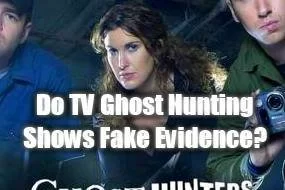 Let's Give Credit Where Credit Is Do
Let's Give Credit Where Credit Is Do
There is no doubt that ghost TV shows (and their stars) have helped grow interest in ghost hunting, stretch investigative techniques, and foster the development of equipment for use in possibly detecting unseen entities. This has, in some ways, been a positive direction for those of us who wish to know whether or not there is life after death. But, for paranormal researchers and scientists who are attempting to prove that the soul lives on post-mortem, such programs have hurt the cause, so to speak. TV ghost hunting shows have come under harsh criticism by researchers with an objective, keen eye who have caught the producers of such shows, and in some cases, even the stars themselves, purposefully faking evidence.
Why Would Ghost Hunting TV Shows Fake Evidence?
If faking evidence, what is the purpose behind such deception? What do producers and some TV stars really get out of it? The answer is age old and quite simple: fame and money.
Production companies are in the business to entertain; and if networks are going to continue to carry their reality TV shows, there better be action. Viewers want to see something actually happen. And if you want to make money (and become a reality television star), you'll need large viewership; otherwise, the television network will replace the production companies' show real fast with something that will make money.
"People don't want the debunk, they want the bunk." - Harry Price
Ghost reality TV stars, at least some of them (we do not wish to lump everyboy together under one assumption), are very similar to famous ghost investigator, Harry Price (see Famous Ghost Investigators, Harry Price's Ghost Hunting Equipment). In other words, the hype, the fame, and the trickery over ghosts and haunting have all been done prior. And the similarities are quite amazing. Harry Price truly conducted ghost investigations, and he advanced the use of devices and techniques in order to make contact with ghosts and spirits; but he also came under question for self-promotion and incredulous 'evidence.' No one was better than Price in creating a story and making it known around the world. For example, in 1936, he held a live broadcast from a haunted house - the first of its kind. In his day, Harry Price could not only write (and embellish) his own stories about his ghost research, he was also able to have them appear on the front pages of newspapers around the world. Price turned the ghost hunt into a form of entertainment before 'reality TV' was the rage.
 LISTEN TO FORMER TAPS INVESTIGATOR DONNA LACROIX TALK ABOUT HER EXPERIENCE ON SYFY'S GHOST HUNTERS (excerpted from the former Internet radio program, 'Ghost Divas.')
LISTEN TO FORMER TAPS INVESTIGATOR DONNA LACROIX TALK ABOUT HER EXPERIENCE ON SYFY'S GHOST HUNTERS (excerpted from the former Internet radio program, 'Ghost Divas.')
SyFy's Ghost Hunters
The first year (2004) of SyFy's Ghost Hunters was a real snoozer. There were very few incidences of Grant Wilson, Jason Hawes and the TAPS (The Atlantic Paranormal Society) team capturing much evidence of haunting. The show survived its first season only because it was a new concept (and the Eastern State Pententiary episode - video footage of a ghost in a black cape would later be said to have a pair of shoes visible underneath; but what fan can forget Brian Harnois saying, "Dude, run!").
If Ghost Hunters was to make it another year, they were going to have to step it up, and step it up they did. Viewers were more than eager to tune-in each week after Grant and Jason's team starting gathering evidence almost every episode. Did TAPS really get that much better at figuring out how to catch a ghost for the cameras or did the producers of the show improve the ways they could edit film, embellish stories, script scenes, and even dupe the audience (and maybe the investigators themselves) with planted evidence?
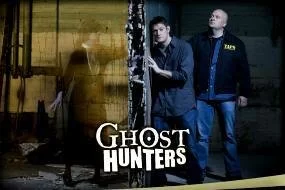 Since Ghost Hunters has been on the air, many examples of its paranormal 'evidence' have come into question (e.g. a cameraman's heat reflection seen on a FLIR thermal imaging camera but claimed by investigators to be a ghost; accusations that audio recordings of ghost EVP were either the voices of crew members talking or blatantly faked by producers; and suspect movement of objects, as if rigged with fishing line, such as a moving picture frame in one episode).
Since Ghost Hunters has been on the air, many examples of its paranormal 'evidence' have come into question (e.g. a cameraman's heat reflection seen on a FLIR thermal imaging camera but claimed by investigators to be a ghost; accusations that audio recordings of ghost EVP were either the voices of crew members talking or blatantly faked by producers; and suspect movement of objects, as if rigged with fishing line, such as a moving picture frame in one episode).
The following are a few of the more infamous blunders that aired on the hit TV show (some of which would be edited out, later):
- In a 2005, during the episode that featured the Queen Mary, the show's producers were exposed faking evidence (they tampered with investigators' surveillance video camers, making the covers of a bed appear to move on their own). TAPS investigators, unaware of the actual culprits, wrongly blamed it on a Queen Mary staff member (who was later proved to have not been onboard the ship).
- In 2006, Ghost Hunters investigated the Moundsville Penitentiary in West Virginia and didn't collect any evidence of haunting. So, to fill part of the hour, Jason and Grant come up with a debunk of the famous Moundsville Shadow Man ghost picture. When reviewing TAPS' hasty debunking, it was too easy to disprove their recreation and incorrect assessment (not to mention tasteless in how they interviewed the person who took the photo, then discredited her afterward.)
- In 2008, on the Ghost Hunters Halloween Special, Grant was caught on film having his jacket hood pulled downward, as if he were pulling a string inside his coat (you could see his right hand pulling downward while he jumped backward to act as if a ghost was pulling on him from behind). Suffice to say there was quite a bit of backlash from both critics and fans after this event aired.

- A 2009 claim by Donna LaCroix (a former TAPS team member who gave a radio interview about what she experienced while on SyFy's Ghost Hunters), that the evidence on the TV show seemed to be staged by its producers, shocked fans. (Listen to the audio recording on this page - above.)
Travel Channel's Ghost Adventures
It began very well in 2007. The soon to be Ghost Adventures team (Zac Bagans, Aaron Goodwin, and Nick Groff) won an award for best documentary for video recording a spooky ghost investigation of the 'Goldfield Hotel' that featured an incredible flying brick (see our Ghost Adventures review).
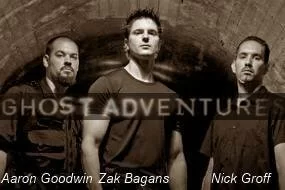 An Empire News article (July 2014) claimed that Aaron Goodwin was let go from the show and that he was forthright with what really happens behind the cameras, alarming fans of what has been considered to be the most authentic ghost hunting saga on television. Goodwin supposedly spouted off during a radio interview about how the Travel Channel made the team record their own voices to be used as fake EVP ghost utterances, including rerecording crew reactions to the false evidence. If no supernatural phenomena was captured by the Ghost Adventures cast during filming, Goodwin supposedly said, according to Empire News, he was sickened to have to act out scenes (that were not real) for the television audience.
An Empire News article (July 2014) claimed that Aaron Goodwin was let go from the show and that he was forthright with what really happens behind the cameras, alarming fans of what has been considered to be the most authentic ghost hunting saga on television. Goodwin supposedly spouted off during a radio interview about how the Travel Channel made the team record their own voices to be used as fake EVP ghost utterances, including rerecording crew reactions to the false evidence. If no supernatural phenomena was captured by the Ghost Adventures cast during filming, Goodwin supposedly said, according to Empire News, he was sickened to have to act out scenes (that were not real) for the television audience.
Aaron Goodwin was cited by Empire News as saying, “This started off as a real thing, it is just not consistent and active enough for the big-shots at the network, so they basically have turned us into liars. We have been committing a fraud in my eyes, and I’ve just about had enough.” (THIS STORY OF AARON HAVING BEEN FIRED TURNED OUT TO BE A FAKE - IT HAS SINCE BEEN PROVEN TO HAVE BEEN A FALSE REPORT.)
But does Ghost Adventures fake evidence? Actually, we do not think so. They do seem to try and debunk their own 'evidence,' and they have the budget and time to spend days within haunted locations they are investigating - something that gives them a better chance at catching something than most of us. And there are some dry episodes with little to offer. Still, In the end, we are safe to say that Ghost Adventures presents a mix of evidence blended with created-hype from the the show's producers. And when producers of television ghost investigation shows choose to promote fear and hype, it lessens their credibility. Sorry - they poison their own well; and by blurring the lines, who can really say what is real and what is false out of their entire presentation?
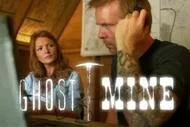 SYFY'S GHOST MINE
SYFY'S GHOST MINE
In January, 2013, a new ghost hunting show debuted on the SyFy channel: Ghost Mine. It claimed to be completely real. But when fans dug deeper, they found its two stars, Kristen Lumen and Patrick Doyle, were not what they appeared to be (e.g. actual ghost investigators).
Miss Lumen, it turns out, was a hired actress, working to make it in Hollywood. Her modeling and acting website has since been taken down. But more startling, Patrick Doyle of ghost investigation fame, believes all ghost hunting shows are solely for entertainment and duping viewers. How do we know this? He once had a website called Haunted Hoax. To be honest, it was a great site. Patrick created video after video, demonstrating how ghost investigative shows, such as Ghost Hunters, were faking evidence. We shared these videos, years ago, and at the time, even had dialog with Patrick about them. He later deleted his website (and YouTube videos) to pursue stardom on Ghost Mine. This was an about-face, a complete departure from Doyle's upstanding Haunted Hoax mission. ("Et tu, Brute?")
The following words of Patrick's are excerpted from his HauntedHoax.net website:
"My name is Patrick Doyle and I'm an addict. For a third of my life, I have researched and investigated paranormal claims. A year ago I stepped away from it all. And when I looked back, I was able to identify conclusive links between the behavior of addicts and the habits of some paranormal investigators.
To these individuals and their ghost hunting teams, their compulsion to capture proof of the paranormal can be as strong as the urge for drugs and alcohol.
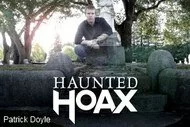 Their world revolves around ghosts. And this immersion has conditioned their minds. So in a moment of over stimulation,
Their world revolves around ghosts. And this immersion has conditioned their minds. So in a moment of over stimulation,
their brains will show them exactly what they need to see and hear.
Because of this discovery I've decided to return with a new project -- turn the cameras away from the hunted and point them at the hunters. I'll ask the questions that have been lurking in the shadows for years. Identify the causes of symptoms, isolate the problems, and offer solutions to the issues and study the psychological and physical effects of fear, stress, isolation, and sensory deprivation that these 'investigators' are subjecting themselves to during the late hours of the night.
Many whom give themselves the title of 'Paranormal Investigator' share similar experiences: seeing human figures, hearing voices, and feeling the touch or breath of an unseen force on their skin. These sensational encounters and the person's undying commitment to prove the existence of ghosts and the afterlife have created a dependency, a need for the chemical rush they receive during intense situation, amplified by anxiety, desire and anticipation.
I have no doubt that paranormal phenomenon and anomalies are being witnessed and experienced by people all over the world; but while the investigators of these claims are reaching out for the answers, I'll be looking in, focusing all my equipment and cameras on them and testing my own theories during their hunt for ghosts and their examination of the evidence.
I am here to expose these behaviors and to help the investigators of paranormal claims and the people frightened by haunted activity identify these symptoms and admit to their own ghost addiction. Investigating the Investigator."
 LISTEN TO PATRICK DOYLE EXPLAIN THAT GHOST HUNTING TV PROGRAMS FAKE EVIDENCE (excerpted from an Internet radio interview)
LISTEN TO PATRICK DOYLE EXPLAIN THAT GHOST HUNTING TV PROGRAMS FAKE EVIDENCE (excerpted from an Internet radio interview)
Conclusion
Former investigators, people who have been involved with the production (representatives of haunted sites, guests of the shows), and critics have all come forth with unsavory claims against many of the ghost hunting TV shows, especially, those we have mentioned in this article. Even if some of the evidence captured by TV's ghost hunting teams are really paranormal, the fact that producers rely upon embellishment of fear and scripted scenes ruins any and all credibility; and the outright faking of paranormal evidence is downright disappointing.
Do TV Ghost Hunting Shows Fake Evidence? Yes, at times, they do.
More Information
Read our past report about SyFy's Ghost Hunters and the TAPS team. We noticed a difference from their humble beginnings to the amount of 'ghost' evidence they were purportedly capturing.
Moundsville Shadow Man Investigation - we go on-site and debunk the debunk by SyFy's TAPS Ghost Hunters who wrongly discredited a famous ghost photograph.

